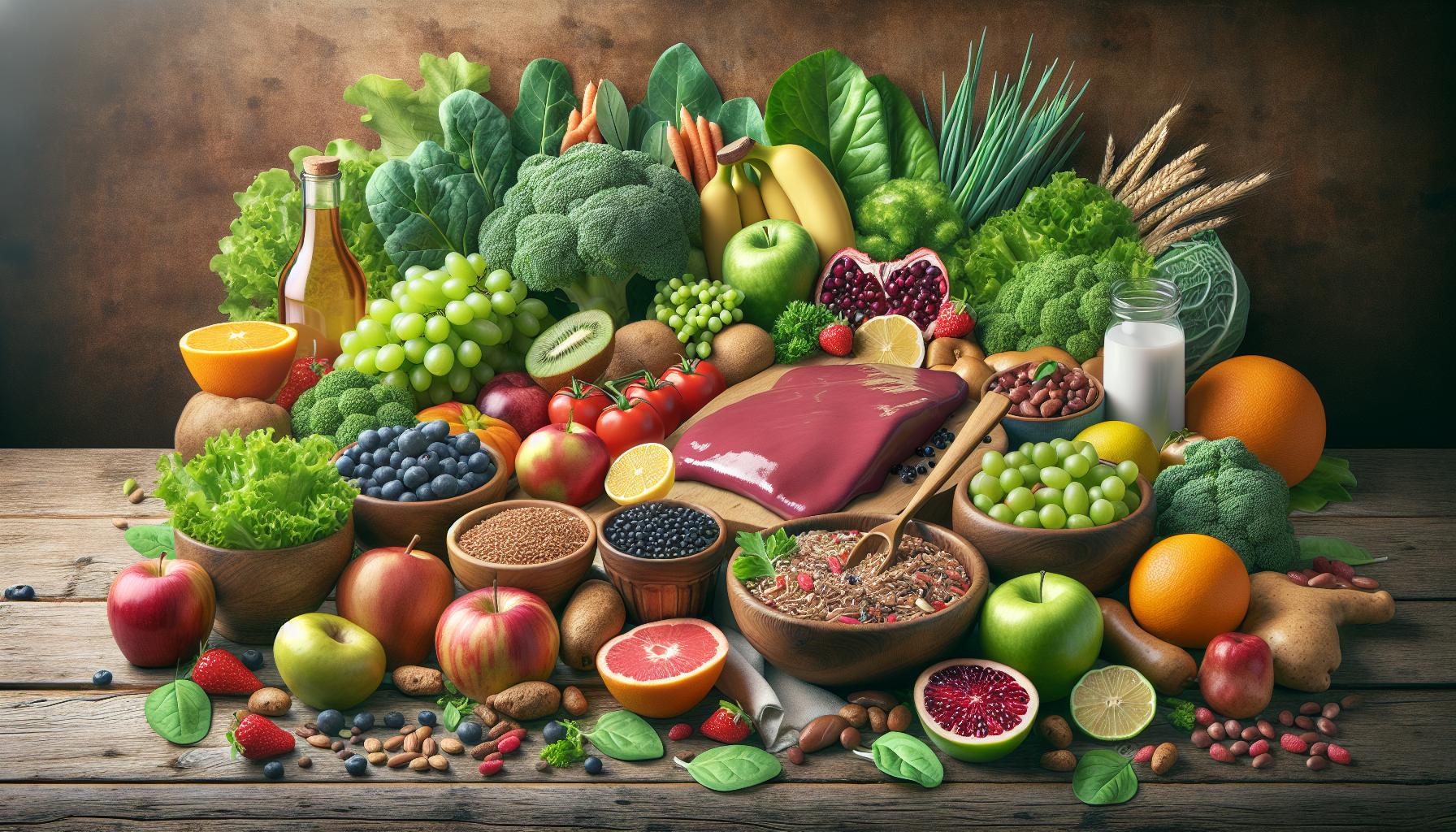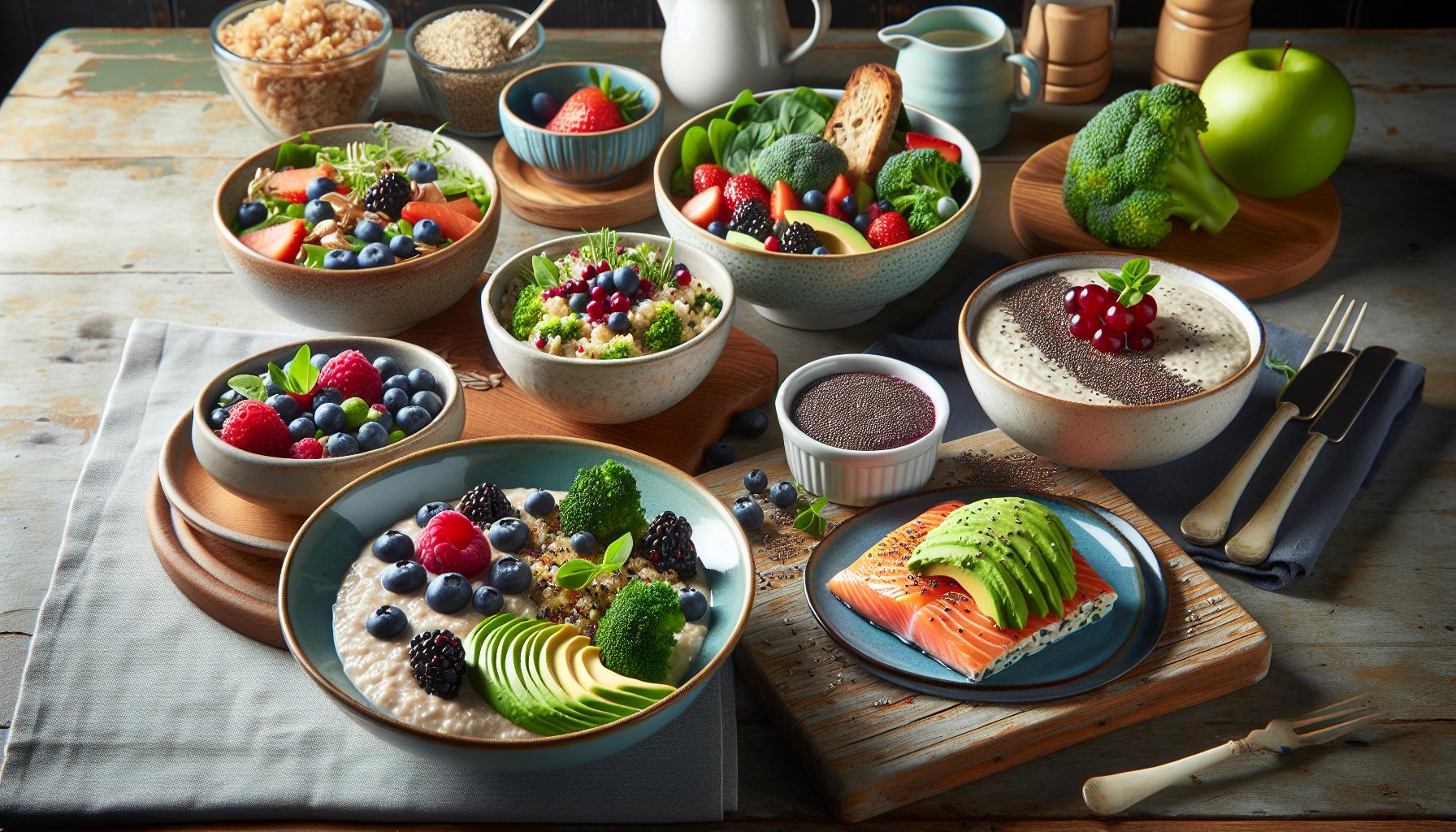Living with fatty liver can feel overwhelming, but it doesn’t have to dictate your lifestyle. I’ve discovered that incorporating healthy recipes into my daily routine not only supports liver health but also makes me feel energized and vibrant. By focusing on nutritious ingredients, I can enjoy delicious meals while nurturing my body.
In this article, I’ll share some of my favorite healthy recipes specifically designed for those managing fatty liver. These dishes are not just good for you—they’re tasty too! From vibrant salads to satisfying main courses, I believe eating well can be both enjoyable and beneficial. Let’s dive into a world of flavors that can help transform your health journey.
Key Takeaways
- Understanding Fatty Liver Disease: Recognize the two main types of fatty liver disease – Alcoholic Fatty Liver Disease (AFLD) and Non-Alcoholic Fatty Liver Disease (NAFLD), and their associated risks and complications.
- Importance of Diet: A balanced diet rich in whole foods, antioxidants, and fiber is essential for managing fatty liver and improving overall liver function.
- Foods to Avoid: Steer clear of high-sugar items, refined carbohydrates, saturated fats, and processed foods, as they can exacerbate fatty liver conditions.
- Healthy Recipes: Incorporate enjoyable and nutritious recipes, such as oatmeal with berries, quinoa salad, and baked salmon, to support liver health while satisfying taste preferences.
- Meal Prep Strategies: Plan meals weekly, prepare ingredients in advance, and focus on batch-cooking to ensure balanced nutrition and encourage healthy eating habits.
- Ingredient Substitutions: Make healthy swaps in recipes, like using whole grains instead of refined ones and natural sweeteners instead of sugar to enhance nutrition without sacrificing flavor.
Healthy Recipes for Fatty Liver
Fatty liver disease occurs when excess fat builds up in liver cells. This condition can lead to inflammation, liver damage, or serious complications without proper management.
Types of Fatty Liver Disease
- Alcoholic Fatty Liver Disease (AFLD): Resulting from excessive alcohol consumption, AFLD affects liver health by causing fat accumulation. It can progress to more severe liver diseases if drinking continues.
- Non-Alcoholic Fatty Liver Disease (NAFLD): Characterized by fat buildup in the liver in those who consume little to no alcohol, NAFLD is linked to obesity, diabetes, and metabolic syndrome. Severe cases can develop into non-alcoholic steatohepatitis (NASH).
- Non-Alcoholic Steatohepatitis (NASH): NASH represents an advanced form of NAFLD and involves liver inflammation and damage. This condition increases the risk of cirrhosis and liver cancer.
- Risk Factors: Common risk factors include obesity, sedentary lifestyle, insulin resistance, high cholesterol, and high blood pressure. Genetics also plays a significant role in susceptibility.
- Symptoms: Symptoms often remain mild or absent initially. Common manifestations may include fatigue, weight loss, abdominal discomfort, and jaundice in advanced cases. Routine medical check-ups can help identify liver health issues early.
Importance of Diet in Managing Fatty Liver


Diet plays a crucial role in managing fatty liver disease. Proper nutrition helps reduce liver fat, improves liver function, and enhances overall well-being.
Role of Nutrition
Nutrition serves as a cornerstone in managing fatty liver. Eating a balanced diet rich in whole foods, including fruits, vegetables, whole grains, and lean proteins, supports liver health. These foods provide essential nutrients that promote liver repair and reduce inflammation. Consuming antioxidants, such as those found in berries and leafy greens, combats oxidative stress, a contributing factor to liver damage. Additionally, fiber from sources like legumes and oats assists in weight management, which is vital for individuals with fatty liver. Staying well-hydrated by drinking water further supports digestion and liver function.
Foods to Avoid
Certain foods can worsen fatty liver and should be avoided. High-sugar items, such as sugary drinks and sweets, contribute to fat accumulation in the liver. Refined carbohydrates, including white bread and pastries, can spike blood sugar levels, exacerbating liver issues. Saturated fats found in fried foods and fatty cuts of meat promote inflammation and fat storage. Processed foods often contain trans fats and preservatives that negatively impact liver health. Limiting alcohol is essential since it can lead to alcoholic fatty liver disease. Prioritizing nutritional awareness can significantly improve liver health and overall wellness.
Healthy Recipes for Fatty Liver


Incorporating healthy recipes into daily meals supports liver health and enhances overall well-being. Here’s a selection of recipes tailored for managing fatty liver effectively.
Breakfast Options
- Oatmeal with Berries: Combine 1 cup of cooked oatmeal with 1/2 cup of mixed berries. Top with a sprinkle of cinnamon and a drizzle of honey for natural sweetness and antioxidants.
- Avocado Toast: Spread 1/2 mashed avocado on whole-grain toast. Add sliced tomatoes and a pinch of salt and pepper for a heart-healthy start to the day.
- Green Smoothie: Blend 1 cup of spinach, 1 banana, 1/2 cup of almond milk, and 1 tablespoon of chia seeds. This nutritious drink boosts fiber intake and supports detoxification.
Lunch Ideas
- Quinoa Salad: Mix 1 cup of cooked quinoa with diced cucumbers, cherry tomatoes, and parsley. Dress with lemon juice and olive oil for a refreshing and protein-rich meal.
- Grilled Chicken Wrap: Fill a whole-grain wrap with 3-4 ounces of grilled chicken breast, spinach, and hummus. This satisfying option provides lean protein and healthy fats.
- Lentil Soup: Cook 1 cup of lentils with diced carrots, celery, and onions in low-sodium vegetable broth. Season with herbs and spices for a hearty and fiber-filled lunch.
Dinner Recipes
- Baked Salmon: Season a 4-ounce salmon fillet with lemon juice, dill, and garlic. Bake at 375°F for 15-20 minutes. Serve with steamed broccoli and brown rice for a balanced dinner.
- Stuffed Bell Peppers: Fill halved bell peppers with a mixture of brown rice, black beans, diced tomatoes, and spices. Bake at 350°F for 30 minutes for a wholesome meal.
- Stir-Fried Tofu and Vegetables: Sauté firm tofu cubes with an assortment of vegetables, including bell peppers and broccoli, in a splash of low-sodium soy sauce. Serve over brown rice for a filling vegan dinner.
- Apple Slices with Nut Butter: Dip apple slices in 2 tablespoons of almond or peanut butter for a nutrient-rich snack that provides fiber and healthy fats.
- Greek Yogurt Parfait: Layer 1 cup of Greek yogurt with 1/2 cup of granola and mixed berries. This dessert offers protein and probiotics without added sugars.
- Chia Seed Pudding: Mix 1/4 cup of chia seeds with 1 cup of almond milk and a touch of vanilla extract. Let it sit overnight for a delicious, fiber-packed treat ready for snacking.
Tips for Incorporating Healthy Recipes


Incorporating healthy recipes into daily meals enhances liver health and overall vitality. Use practical strategies for effective meal prep and ingredient substitutions.
Meal Prep Strategies
Plan weekly meals to streamline cooking and ensure balanced nutrition. Prepare ingredients like chopped vegetables and lean proteins ahead of time to save cooking time. Assembling meals in advance helps control portion sizes, reducing the likelihood of unhealthy choices. Batch-cook items such as quinoa or whole grains for quick, nutrient-rich bases in various dishes. Consider using labeled containers for easy storage and access to prepped ingredients. Focus on recipes that store well, allowing meals to last several days without losing flavor.
Making Substitutions
Substituting ingredients can lead to healthier meals while maintaining flavor. Swap refined grains with whole grains such as brown rice or whole wheat pasta. Replace saturated fats with healthier options like olive oil or avocado. Use fresh herbs and spices instead of salt for flavor enhancement. In baking, replace sugar with natural sweeteners like honey or maple syrup, reducing sugar intake. Choosing lower-fat dairy alternatives, such as Greek yogurt instead of sour cream, maintains creamy textures with fewer calories. Experimenting with these substitutions can make recipes healthier while satisfying taste preferences.
Liver Health
Embracing a healthy lifestyle while managing fatty liver is entirely possible and can be genuinely rewarding. I’ve found that incorporating nutritious recipes into my daily routine not only supports my liver health but also elevates my overall well-being.
By focusing on whole foods and making mindful choices, I’ve experienced increased energy and vitality. Remember that it’s not just about avoiding unhealthy options but also about enjoying the delicious meals that promote liver repair.
As I continue this journey, I encourage you to explore these recipes and strategies. Making small changes can lead to significant improvements in your health and happiness. Let’s prioritize our liver health together and savor the journey towards a healthier life.



